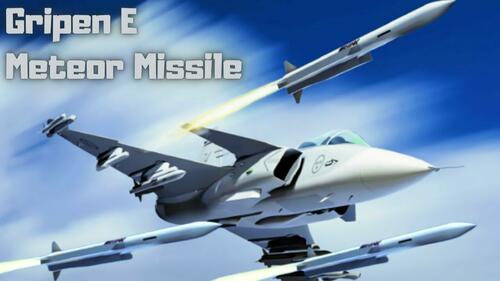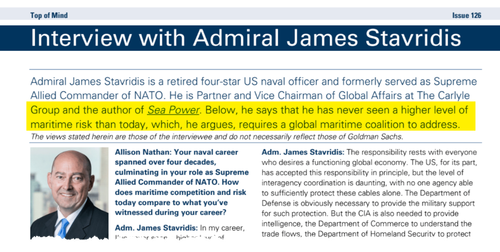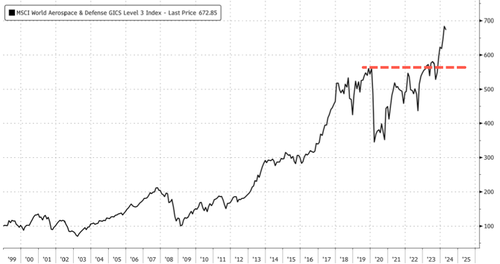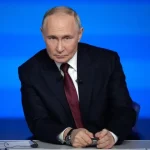
Let's start with these five most recent headlines that show why defense spending needs to increase in a world evolving into a multi-polar state marked by conflict and uncertainty:
-
World Stumbles Into "More Dangerous Decade" As Defense Spending Soars, Says Military Think Tank
-
Germany Reportedly Goes On Military Spending Spree To Hit NATO Spending Minimums For First Time
-
Lockheed Martin Wins $17BN Interceptor Contract To Protect US Homeland
-
German Tank Builder Says "New Decade Of Security Policy Begins" As Defense Bull Market Roars
Saab CEO Micael Johansson, who spoke with Bloomberg TV on the sidelines of the European Defence & Security summit in Brussels on Wednesday, expanded more on the risks of escalating conflict in Eastern Europe and the Middle East and how uncertainty will drive defense spending higher.
Bloomberg's Oliver Crook asked Saab CEO Johansson: "I just want to start with the sort of latest developments that we saw from Iran and Israel and the attacks. Do you think that that is going to encourage even more spending, or do you think it changes things in the defense industry, or is this more of the kind of story that we've been seeing unfold?"
Johansson responded, "Well I think it's um the political focus on what sort of where the threat environments is in the world will of course change a bit. I'm more worried that the the focus on the war in Ukraine will sort of disappear and that uh that wouldn't be good."
"I think all tensions, all threat environments, and the political tensions that happen now will definitely drive defense spending. It's hard to say whether this sort of what's happening in the Middle East now will ultimately result in even more defense spending. But I think right now, the focus on Ukraine versus the Middle East is worrying me," he continued.
Crook then asked: "It's hard to get exact figures on this, but I saw some reporting saying that you know - much has been made as Israel's very successfully shooting down these 300 drones and missiles - though the cost approximate associated with that was sort of $600 million. And I saw that's 2 million per drone - and the economics of that if you have a prolonged conflict doesn't really work. So, as a defense company, how do you think about this? How do you solve that problem?"
Before Johansson responds, let's introduce readers to Saab, a Swedish aerospace and defense company that supplies NATO countries and allies with missiles and bombs. Some of those weapons include anti-ship missiles, anti-drone missiles, and anti-tank missiles.
Back to Johansson's response: "You have to take them out with the systems you have, but over time this will change. I think it'll become more efficient, and we're all putting research into this."
He also reiterates that Europe must boost its military-industrial complex manufacturing capacity to reduce its reliance on weapon imports from outside the EU.
Here's the interview.
Early this year, military think tank International Institute of Strategic Studies said global defense spending jumped 9% to a record $2.2 trillion in 2023, driven mostly by heightened geopolitical tensions caused by the Russia-Ukraine conflict.
In March, former Allied Commander at NATO, Adm. James Stavridis, told Goldman Sachs' Allison Nathan, "In my career, I've never seen a higher level of maritime risk than I do today. That owes first and foremost to the return of great power competition, which we thought was basically over when the Soviet Union collapsed."
And now, risks of further escalation between Israel and Iran have driven global defense stocks to fresh record highs.
Johansson is correct. The defense industry is in a bull market. War = moar money for the military-industrial complex.
Let’s start with these five most recent headlines that show why defense spending needs to increase in a world evolving into a multi-polar state marked by conflict and uncertainty:
Saab CEO Micael Johansson, who spoke with Bloomberg TV on the sidelines of the European Defence & Security summit in Brussels on Wednesday, expanded more on the risks of escalating conflict in Eastern Europe and the Middle East and how uncertainty will drive defense spending higher.
Bloomberg’s Oliver Crook asked Saab CEO Johansson: “I just want to start with the sort of latest developments that we saw from Iran and Israel and the attacks. Do you think that that is going to encourage even more spending, or do you think it changes things in the defense industry, or is this more of the kind of story that we’ve been seeing unfold?”
Johansson responded, “Well I think it’s um the political focus on what sort of where the threat environments is in the world will of course change a bit. I’m more worried that the the focus on the war in Ukraine will sort of disappear and that uh that wouldn’t be good.”
“I think all tensions, all threat environments, and the political tensions that happen now will definitely drive defense spending. It’s hard to say whether this sort of what’s happening in the Middle East now will ultimately result in even more defense spending. But I think right now, the focus on Ukraine versus the Middle East is worrying me,” he continued.
Crook then asked: “It’s hard to get exact figures on this, but I saw some reporting saying that you know – much has been made as Israel’s very successfully shooting down these 300 drones and missiles – though the cost approximate associated with that was sort of $600 million. And I saw that’s 2 million per drone – and the economics of that if you have a prolonged conflict doesn’t really work. So, as a defense company, how do you think about this? How do you solve that problem?”
Before Johansson responds, let’s introduce readers to Saab, a Swedish aerospace and defense company that supplies NATO countries and allies with missiles and bombs. Some of those weapons include anti-ship missiles, anti-drone missiles, and anti-tank missiles.
Back to Johansson’s response: “You have to take them out with the systems you have, but over time this will change. I think it’ll become more efficient, and we’re all putting research into this.”
He also reiterates that Europe must boost its military-industrial complex manufacturing capacity to reduce its reliance on weapon imports from outside the EU.
Here’s the interview.
[embedded content]
Early this year, military think tank International Institute of Strategic Studies said global defense spending jumped 9% to a record $2.2 trillion in 2023, driven mostly by heightened geopolitical tensions caused by the Russia-Ukraine conflict.
In March, former Allied Commander at NATO, Adm. James Stavridis, told Goldman Sachs’ Allison Nathan, “In my career, I’ve never seen a higher level of maritime risk than I do today. That owes first and foremost to the return of great power competition, which we thought was basically over when the Soviet Union collapsed.”
And now, risks of further escalation between Israel and Iran have driven global defense stocks to fresh record highs.
Johansson is correct. The defense industry is in a bull market. War = moar money for the military-industrial complex.
Loading…







